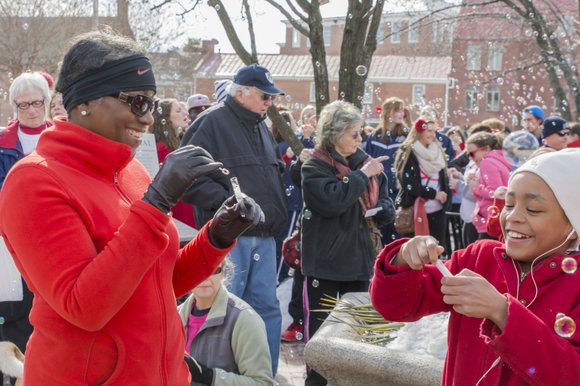The Heart Health Foundation’s mission to paint the town red for the month of February got off to a celebratory start on Saturday, February 1 in Annapolis with a heart walk parade that covered several city blocks before winding down on Main Street.
“We’re trying to create awareness in the community about heart disease and the fact that more women die of heart disease than anything else,” said Elaine Gary, director of the Dare to C.A.R.E. Program and a former patient whose heart screening led to lifesaving surgery.
Dare to C.A.R.E. (DTC) is a nonprofit organization located in Annapolis, and is directed by Dr. John D. Martin, and Louise O. Hanson, of Cardiology Associates, PC.
It began in 2000, and since then has been attended by thousands of people, many of whom have had life-saving procedures as a result of disease detected at DTC events.
“Cardiovascular disease is the number one health problem in this country today. More than half of Americans will die from complications of atherosclerotic disease, the root cause of cardiovascular disease and millions more will suffer debilitating complications that rob many Americans of a meaningful quality of life,” said Martin, who along with Hanson, founded the Heart Health Foundation program, which helps to save lives by offering free cardiovascular disease screenings.
Martin, the medical director of the Heart and Vascular Institute at Anne Arundel Medical Center in Annapolis, has helped the center to become a nationally recognized facility for the treatment of vascular disease.
DTC screenings are responsible for the detection of the early stages of the disease in many who had no idea they were ill. To date, the program has screened more than 40,000 patients and there are 19 DTC screenings sites around the country.
Martin says that his goal is to extend his program across the country and to continue to educate and save lives.
“We’re pretty excited about the momentum and with the walk, people are starting to realize the importance of this,” Martin said. “Statistics show that heart disease is the country’s number one killer. Cancer creeps in at number two, but heart disease, stroke, and the like begins to dwarf all of the numbers, which is staggering.”
More than half of Americans will die from complications of atherosclerotic disease, the root cause of cardiovascular disease. Millions more will suffer debilitating complications that will rob them of a meaningful quality of life, according to Gary.
“One million Americans die of heart attack, stroke, high blood pressure and other cardiovascular disorders every year in the United States— that means two out of every five deaths in the United States or one life every 33 seconds. Unfortunately, the majority of people with this disease are unaware of their problem until severe complications or death occur,” she said.
Through the efforts of volunteers and the use of lectures, educational materials, free ultrasound testing and meetings with cardiovascular specialists, DTC brings the message that complications of cardiovascular disease can be prevented.
The testing portion of the program consists of a blood pressure check and a non-invasive ultrasound examination of the carotid arteries, abdominal aorta, and evaluation of leg circulation.
The second component of the program involves attending an evening of informative lectures about cardiovascular disease given by physicians and nurse practitioners. Topics include the definition of the various types of cardiovascular disease, causes and risks for the disease, and the latest treatment options.
“We have already raised funds and have initiated the mission of providing free programs to all at-risk individuals in our region,” Martin said. Risk factors include age (greater than 60) and health issues such as high blood pressure, high cholesterol, diabetes, smoking or family history of cardiovascular disease. Individuals over the age of 50 who have any of the listed risk factors are also considered at-risk.
Martin said he hopes to expand the program statewide in order to set an example of cardiovascular health for the nation. “DTC is a program we can all be very proud of and a gift we give graciously to our participants,” he said.
